




So, let’s start with the bad stuff. That terrible moment when you arrive for your flight from Gatwick Terminal 5 only to discover that there is no Gatwick Terminal 5, only a South and a North terminal and the helpful airport staff desk man you talk to, while your mobile phone decides to restart for five minutes at the exact moment you plan to show him your emailed airline ticket, gently explains that Terminal 5 is at Heathrow not Gatwick. Fortunately, the sinking feeling doesn’t last long: the flight notification says Gatwick Terminal 5 (so I haven’t misread it, at least) but the actual ticket says Terminal S. Something got lost in transcription, not unlike the French labelling the box of gold Eiffel Tower models with a letter pronounced differently in French and English in the Ealing Studios classic The Lavender Hill Mob (Charles Crichton, 1951).
The rest of the journey on Air Baltic proceeds without incident, except that I make the mistake of wearing heavy boots and a thick ski jacket borrowed from the neighbours back home, overheat en route and arrive at the Nordic Hotel Forum in Tallinn late at night with a filthy headache. By 3am I’m still not asleep, so I drag myself down to the main desk. The hotel staff aren’t allowed to give out medication, but the night desk manager in his capacity as a compassionate human being rather than a rule-bound employee helpfully gives me two of his own Ibuprofen, which I take and finally get off to sleep. I feel much better in the morning. (This is indicative of the generally high standard of service from the helpful and pleasant desk staff at the Nordic Hotel Forum.)
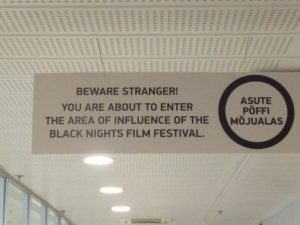
To backtrack: Before getting off the plane, I use the loo which means I’m last off and have a short walk through an almost empty Tallinn airport. I’m greeted by signs saying BEWARE STRANGER! YOU ARE ABOUT TO ENTER THE AREA OF INFLUENCE OF THE BLACK NIGHTS FILM FESTIVAL, PURE MIND and the ubiquitous festival acronym PÖFF. Before even picking up my checked luggage, I feel I’ve arrived in the Festival; Tallinn is not that huge a city (compared, for example, to London, which is so big that the annual London Film Festival inevitably gets lost among myriad other, concurrent, urban cultural activities) and PÖFF makes a sizeable impact on the city for the best part of two weeks for which it runs. It clearly helps that the PÖFF team know how to pitch the Festival to give it some much-needed branding presence. Being quite a small festival probably works in PÖFF’s favour too.
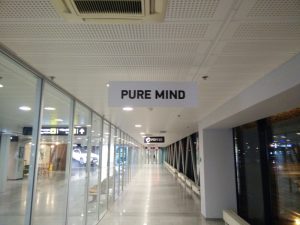
The Wi-Fi at the Nordic is as good as I can remember Wi-Fi being anywhere. The room is a thing of beauty, although I have to improvise a bit using folded bedspreads to raise the height of the desk seating, a big oblong pouff. Anyway, it’s a good working space. Next time, I must remember to ask for a room facing outward as the view would be better, although on the sixth floor, I have a nice view of the fifth floor roof. After a few days, I get round to trying out the pool, steam room and sauna, all of which provide a welcome break to working.
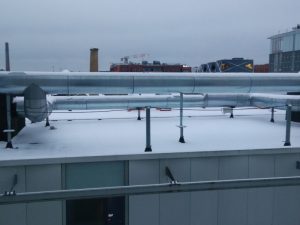
The day after I arrive, the news comes through on the BBC that Russia has launched a missile at Poland, which landed in a field killing two people. Since I’m due to fly back with a stopover at Frederic Chopin Warsaw airport, this is a cause for some concern. But as the days pass, the Western politicians talk it down and it eventually turns out not to have been the Russians at all, but a missile fired from Ukraine which went off course and which they tried to blame on the Russians. There’s clearly no love lost between the international film community and the Russians at the moment: not a single Russian film in the catalogue. Let’s hope Putin falls soon and is replaced by someone who can take the country in a more sane direction.
Festivals often put on events for guests, to promote both their national and local culture and various films or strands within the festival itself. On the first count, I availed myself of a bog walk and a trip round the town. The bog walk turned out to be a marshland walk, for which we had to be loaned snowshoes, something I’ve never worn before. The day we went, the second day I was there, it had just snowed, so everything has a light dusting of white. We went through some woodland, all natural, no wooden walkways or anything man-made underfoot, then donned the snowshoes for the more open marshland. With a dozen or so pairs of feet going squish squish squish it was rarely quiet, but when we all stopped and stood still for a minute or two, as we did on a couple of occasions, the silence was palpable. Walking on this springy land was a curious experience: I was reminded of the landscapes of C.S.Lewis’ SF novel Perelandra a.k.a. Voyage To Venus (1938) as well as the movie Stalker (Andrei Tarkovsky, 1979). You couldn’t plan or book this happening on the first day of snow; it just happened that way, which turned out to be really good luck and I felt immensely privileged in that regard.
As for the trip round the town, we got a glimpse of cobbled streets, incredible medieval architecture and a look inside the Orthodox church (where various people were told off for not removing their hats). There was a marked difference in the area where the rich people lived, with the houses much bigger and more mansion-like. Our guide, a Mexican lady with a long-haired chihuahua, was supposed to take no more than twenty, but our numbers were maybe twice that. “It’ll be a shitshow,” she cheerfully declared as we set out; her upbeat attitude was infectious. As we worked our way round the town, the numbers dwindled, rather like a horror film where people in a touring party get picked off one by one, until there were only about four people left. I’d like to think those who vanished left to explore food or drink emporia, or sites of historical interest, or art galleries, or whatever caught their eye, rather than being kidnapped by some nefarious Estonian gang or bumped off by some terrible, dark monster lurking in the shadows – but, who knows?
On the second count, there are the parties and events put on by either the Festival or a company promoting a film or perhaps a particular country with a number of films in the Festival. My best evening this year was the Shorts Awards – I hadn’t actually realised that’s what it was initially, although the fact that preference was given to people working in animation and shorts sounded good to me.
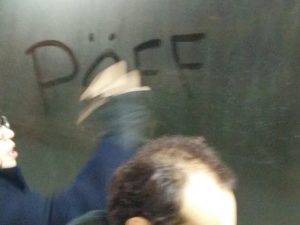
So we meet outside the Metropole Hotel at the appointed time, have orders barked at us to stand in line at -4°, are marshalled to a tram stop, wait, get on, probably about twice as many people as should legally be a on a tram, so all the windows steam up, and you can’t see anything outside the tram, which doesn’t really matter, are handed shots of vodka (which quickly warms you up!) and beer, drive around for a while, people write PÖFF with fingers on the steamed window (pictured above), we come to a stop where we are marshalled off the tram on to a coach which drives out to the edge of Tallinn and this massive, unheated warehouse with weird blue light like something out of a science fiction movie (below).
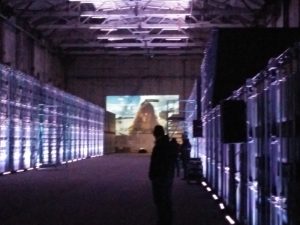
Everyone goes down one end, where you can’t see the awards presentation properly because the stage isn’t high enough, but that’s immaterial because they project the recorded speeches of the winners on a screen up the other end of the warehouse. An amazing experience, forever etched on my memory, unlike any other awards ceremony I’ve ever attended.
That ought to be enough for one night, but to cap it all, back at the Nordic, I get introduced to the writer-director of one of the films I most enjoyed this year, Çigdem Sezgin of Suna (2022; pictured at the top of this article), and a number of us chat about this and that for quite a while. Her English is pretty good (my Turkish, sadly, is non-existent). Later on, the film’s lead Nurcan Eren, who hadn’t said much (I suspect she doesn’t speak English) and is a huge singing star in Turkey, is persuaded to sing a couple of songs impromptu at the hotel bar. Somehow, this seems to capture the open spirit of the Festival, journalists, talent and other industry types all mixing with one another. Altogether a memorable evening.
.
The movie marathon begins
I had all sorts of ideas about seeing lots of movies in addition to the Critics’ Picks strand I was there to cover, but in the end I didn’t see that much beyond those. The first day, unplanned, I managed to watch the three Kids Animation Programmes as they were press screening back to back and was impressed by the high standard – not one dud in there, one of the best programmes of children’s animated shorts I’ve ever seen. I caught some other animation: the wonderful My Love Affair With Marriage (Signe Baumane, 2022, pictured below) in which a woman outlines her experiences with sex, romance and finding a life partner (or not) which deserves a wide release, the harrowing but brilliant Aurora’s Sunrise (Inna Sahakyan, 2022) which mixes animated recreation of a survivor’s testimony with fragments of a silent feature about the Armenian Massacre believed lost ‘til recently, and had a long discussion with Elisa Eliash the director of animation / live action hybrid Fever (2022), which hopefully I’ll catch before long.
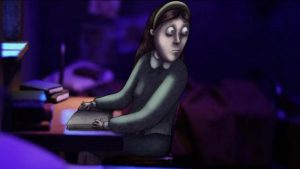
I also managed to see a few Oriental entries, among them South Korea’s full on but ultimately disappointing The Other Child (Kim Jin-young, 2022) and Japan’s rather better, beautifully handled Double Life (Enen Yo, 2022). In the Critics’ Picks section, the best of the Oriental films for me was Kim Ki-duk’s decidedly weird Call Of God (2022), screening out of competition, while About Us But Not About Us (Jun Robles Lana, 2022) from the Philippines picked up the Jury Prize in the Critics’ Picks section.
Italian crime movie The Bone Breakers (Vincenzo Pirrotta, 2022) about people agreeing to have their bones broken in an insurance scam picked up a special mention. Unless you’re on a jury, you’re not privy to all the deliberations as to why one film was picked up rather than another, and I’ve often found that the films which win awards aren’t the ones that speak to me – I was far more affected by the other crime movie in the strand, Roxy (Dito Tsintsadze, 2022) about a German taxi driver and a killer dog. As well as the two crime movies, there was a good spread of work in the section, most of it strong – a comedy, an historical drama, films about identity and memory, films about filmmaking.
The other Critics’ Pick I particularly liked was the aforementioned Suna, a perfectly constructed and compelling essay on the plight of 50-year-old Turkish women. That doesn’t sound like my sort of thing, but it had me hooked from start to finish. I hope both Roxy and Suna catch the imagination of international – and UK!!! – distributors. As for the name directors, Typist Artist Pirate King (Carol Morley), Sparta (Ulrich Siedl) and Call Of God (Kim Ki-duk) all deserve to be more widely seen. Not one animated or part-animated feature in the section though – why not?
For the return journey, I had a half hour delayed first flight, and was worried I might miss my connecting flight, but was impressed overall by Polish airline Lot who did everything to put passengers at ease, including a choice of sweet or savoury Polish bun and free tea or coffee. Brexit meant that at Warsaw, Brits had to get passports stamped because we are no longer in the EU’s Schengen free movement area, a nerve-wracking experience as there is always the possibility that you’ll get stuck behind someone with an impossibly complex issue and as a result miss your connection. If you are one of the great gaslit who voted Leave, or didn’t bother to vote, this unnecessary, extra bureaucracy is your fault!
I was glad to be back in London, although it didn’t take long to be reminded that the UK is run by a government who hold most of the population in contempt, which is why we got Brexit (people believed that that contempt was the EU’s fault) and is also why various sectors are now going on strike. Friday night, the RMT union (whose cause generally has my sympathy) decided to remind everyone, on the anniversary of the Kings Cross fire, that current Tube staffing levels would make evacuation difficult if anything similar happened again. They did this by closing a number of Tube stations, including those intersecting with rail terminals on the Victoria Line. Sadly, no one bothered to tell this to passengers coming in from Heathrow on the Friday night (in order to avoid the rail strike scheduled for the Saturday) until an in transit Circle Line announcement informed the travelling public that trains were not stopping at Kings Cross.
So I got out at Euston Square only to discover that Euston underground station was closed as well as Kings Cross, something the announcement had neglected to mention. I promptly caught a 73 bus to Dalston, then worked out I could get the 259 home to Tottenham where I live from York Way, outside Kings Cross. Fortunately it wasn’t too crowded. We Londoners live with this kind of pandemonium all the time, which makes for an interesting comparison with Tallinn where for the 10 days I was at the Festival I felt very well looked after. People I talked to who lived there seemed to like it a lot. And the Black Nights Festival is a good size – not too large, most of the screenings within minutes of the Nordic Hotel and generally scheduled to avoid silly clashes or overlapping screenings (are you listening, London Film Festival?!!) Basically, a real pleasure; my first visit to Tallinn, and almost certainly not my last.
Critics’ Picks – In Competition
Critics’ Picks – Out of Competition
Bonus – Kids Animation Programme
Critics’ Picks: a brand-new film selection hits Tallinn





















